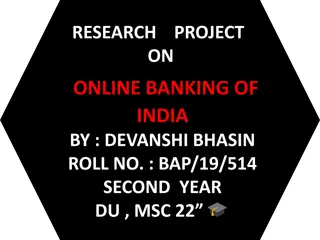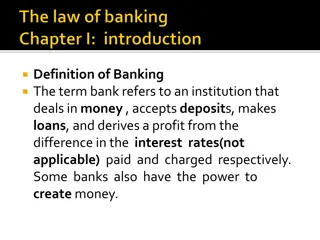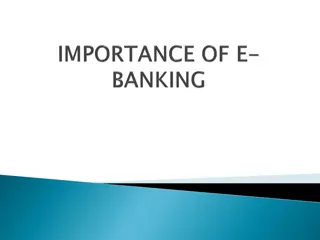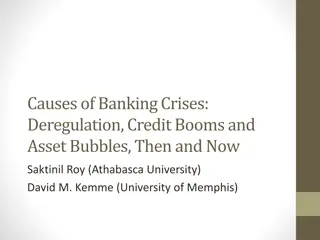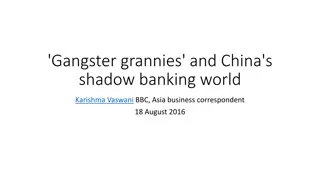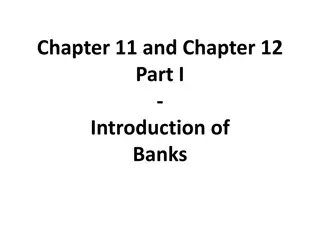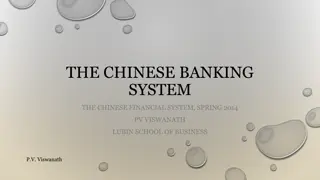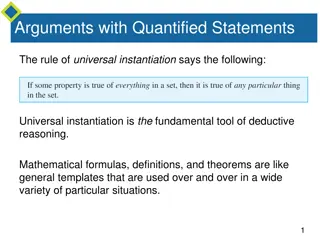Understanding Universal Banking: Evolution, Definition, and Advantages
Universal banking combines commercial and investment banking services under one roof. This approach offers diverse financial services, promoting economies of scale and profitable diversification. The evolution of universal banking in India has been influenced by regulatory changes and the growing demand for comprehensive banking solutions. The concept addresses the need for banks to adapt to the changing global retail financial services market and meet customer expectations for varied services. By embracing universal banking, institutions can streamline operations, enhance resource utilization, and build trust with investors.
Download Presentation

Please find below an Image/Link to download the presentation.
The content on the website is provided AS IS for your information and personal use only. It may not be sold, licensed, or shared on other websites without obtaining consent from the author. Download presentation by click this link. If you encounter any issues during the download, it is possible that the publisher has removed the file from their server.
E N D
Presentation Transcript
CHAPTER 5 UNIVERSAL BANKING
INTRODUCTION : Universal Banking is a name given to bank engaged in diverse kinds of banking activities. Under the universal banking system, the banks do broad-based and comprehensive activities. The term universal banking, in general refers to the combination of commercial banking and Investment banking.
DEFINITION : The term ' universal bank ' has different meaning, but usually it refers to the combination of commercial banking and Investment banking. It is a multi-purpose and multi- functional financial supermarket providing both banking and financial services through a single window.
EVOLUTION OF UNIVERSAL BANKING IN INDIA: In 1997, the RBI constituted a working group under the chairmanship of khan (Chairman and the Managing Director of IDBI) to work on ' Harmonising the Role and Operations of Development Financial Institutions and Banks". This working given a strong recommendation for a progressive movement towards universal banking for the Development Financial Institutions (DFIs).
Following are the recommendation of working group: A progressive move towards universal banking. Development of regulatory framework for the above purpose. A full bank license is eventually granted to DFIs. RBI and Government should provide an appropriate level of financial support in case DFI and assure any developmental obligator. Management of banks and DFI should be permitted to enter into the DFI merge .
NEED FOR UNIVERSAL BANKING: 1. The global retail financial services market is growing very fast and chains of foreign banks are attacking traditional banks by offering new products of loans and investment portfolios under one roof. 2. Liberalisation and de-regulation of financial market have led to destruction of traditional branch services. 3. Customers are also expecting and demanding various products and services under one roof. 4. The bank can diversify it's existing expertise in one type of financial services in providing the other types.
ADVANTAGES OF UNIVERSAL BANKING: 1. Economies of scale. 2. Profitable diversification. 3. Resource utilisation. 4. Investors trust. 5. Easy marketing. 6. Under one roof.
LIMITATIONS OF UNIVERSAL BANKING: 1. Different rules and regulations. 2. Risk of failure. 3. Monopoly. 4. No expertise in long term tending. 5. Conflict of interest.
PRODUCTS AND SERVICES OFFERED BY UNIVERSAL BANK:
OTHER SERVICES : Services to Government. Merchant banking. Payment and settlement. Mutual funds. Depository services. Wealth management. Portfolio management. Bancassurance. NRI Remittance.
SERVICES TO GOVERNMENT: The bank can also act as an agent of the Government or local authority. They insure, guarantee, underwrite, participate in managing and carrying out issues of shares, debentures, etc. It undertakes the inward and outward Remittances with reference to foreign exchange and collection of varied types for the Government.
MERCHANT BANKING: Universal bank provides the services of merchant banking . Merchant banking is a combination of banking and consultancy services. It provides consultancy to its clients for financial, marketing, managerial, and legal matters. Role of merchant banking: Merchant banker advises regarding identification of the project, preparing feasibility report, selection of location of the project, size of organisation, investment decisions obtaining government approval etc.
In India, following are the services mainly rendered by merchant bankers. They are as follows: Managing of public issues of securities. Underwriting of public issues. Portfolio investment management services. Project counselling. Advisory services relating to mergers and takeovers. Loan syndication. Investment services for NRIs. Offshore financial. Providing Providing margin money for working capital. Restructuring servicesand etc.
PAYMENT AND SETTLEMENT : Indian banks are using multiple payments and settlement systems. The payment and settlement system comprises of various arrangements that is used to systematically, efficiently and securely transfer money, cheques, demand draft and money through various electronic channels.
MUTUAL FUNDS: The term mutual fund means getting mutual benefits i.e the investors contribute to the pool and also benefit from the pool of funds. They are both contributors and beneficiaries. This is a type of investment channel for small investors. Universal banks help the small investor to invest in stock market indirectly through mutual fund.
FEATURES OF MUTUAL FUND : Mutual fund is a special type of investment channel. Mutual fund is a vehicle for collective investment of small saving unit. Mutual fund is an alternative to the small savers ib surplus sector who rely on bank deposits. Mutual fund belongs to the investors and its ownrrship is in hands of the investor. The value of one unit of investment is called Net Asset Value (NAV).
WEALTH MANAGEMENT : Wealth management combines both financial planning and specialised financial services including personal retail banking services, legal and tax Davies and investment management services. The goal of wealth management is to sustain and growling term wealth. Banks provide a comprehensive suite of services designed to meet the customers banking financial and investment needs.
Investment products for wealth management is divided into two types, they are as follows: 1) Traditional products : Direct equity. Mutual fund. Insurance. Banking accounts and credit services. 2) Specialised products : Structured product - equity, currencies, commodities. Private equity. Real estate. Estate planning. Commodities, etc.
PORTFOLIO MANAGEMENT : Portfolio management is a process of investment in securities. It involves a proper investment decision- making. The objective of this service is to help investor with the expertise of professionals. It involves construction of a portfolio based upon the fact sheet of the investor giving out his Objectives; constraints, preferences and tax liability. Portfolio management service is tailor made professional service offered to cater the investment objective of different investor clause.
BANCASSURANCE : Bancassurance is the distribution of insurance products by banks as corporate agents through their branches located in different parts of the country. The banks have to obtain prior approval of the Insurance Regularity Development Authority (IRDA) for acting as composite corporate agent. It helps the banks to build synergies between the insurance business and bank branch network to sell insurance products through banking channels because the bank branches have a ready customer in need of financial services.
NRI REMITTANCE : Non-Resident Indian (NRI) means a person resident outside India who is a citizen of India. Remittance outside India of current income like rent, dividend, pension , interest, etc.in India of the account holder is a permissible debit to the NRO (Non-Resident Ordinary) account. If NRI do not have NRO account, then through authorised dealer banks may allow repatriation of current income. A NRI may remit an amount upto USD one million, per financial year.
Thank you.







